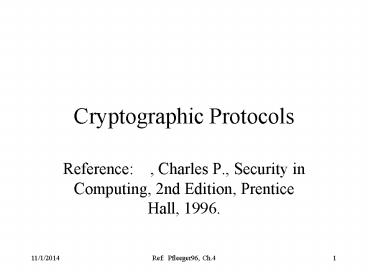Cryptographic Protocols - PowerPoint PPT Presentation
1 / 10
Title:
Cryptographic Protocols
Description:
Cryptographic Protocols Reference: , Charles P., Security in Computing, 2nd Edition, Prentice Hall, 1996. Definition of Protocols A protocol is an orderly sequence of ... – PowerPoint PPT presentation
Number of Views:138
Avg rating:3.0/5.0
Title: Cryptographic Protocols
1
Cryptographic Protocols
- Reference , Charles P., Security in
Computing, 2nd Edition, Prentice Hall, 1996.
2
Definition of Protocols
- A protocol is an orderly sequence of steps two
ore more parties take to accomplish some task.
3
Characteristics of a Good Protocol
- Established in Advance
- Completely designed before it is used.
- Mutually Subscribed
- All parties agree to follow protocol steps, in
order. - Unambiguous
- Steps cannot be misunderstood.
- Complete
- For every situation that can occur there is a
prescribed action to be taken.
4
Design and Implementation
- A protocol sets the rules of behavior, as well
as separates the process of accomplishing the
task from the mechanism by which it is done. - Design assures that the protocol is correct.
- Implementation simply requires a mechanism, which
can change without affecting the design.
5
Arbitrated Protocols
- An arbiter is a disinterested third party trusted
to complete a transaction between two distrusting
parties. - In a computer protocol, an arbiter is a
trustworthy third party who ensures fairness. - The arbiter could be a person, program, or a
machine.
6
Problems with Arbitrated Protocols
- Trustworthy neutral third party is hard to find.
- Maintaining availability of arbiter is costly.
- Arbitration causes communications delay.
- Arbitration service is a network bottleneck.
- Secrecy is vulnerable, since arbiter has access
to so much sensitive information.
7
Adjudicated Protocols
- An adjudicator is a third party who can judge
whether a transaction was performed fairly--for
example, a notary public. - With adjudicated computer protocols, enough data
is available for a third party to determine if
two parties acted fairly. - However, failure is detected only after it has
occurred.
8
Self-Enforcing Protocols
- A self-enforcing protocol guarantees fairness.
- If either party cheats, it is obvious to the
other party.
9
Comparing the Protocols
- The self-enforcing protocols are preferred, but
not always possible. - Adjudicated protocols are preferred over
arbitrated protocols.
10
Cryptographic Protocols
- There are a number of problems that can be solved
using secure protocols. - Key Distribution
- Authentication of Keys
- Authentication of Transactions
- Contract Signing
- Certified Mail































